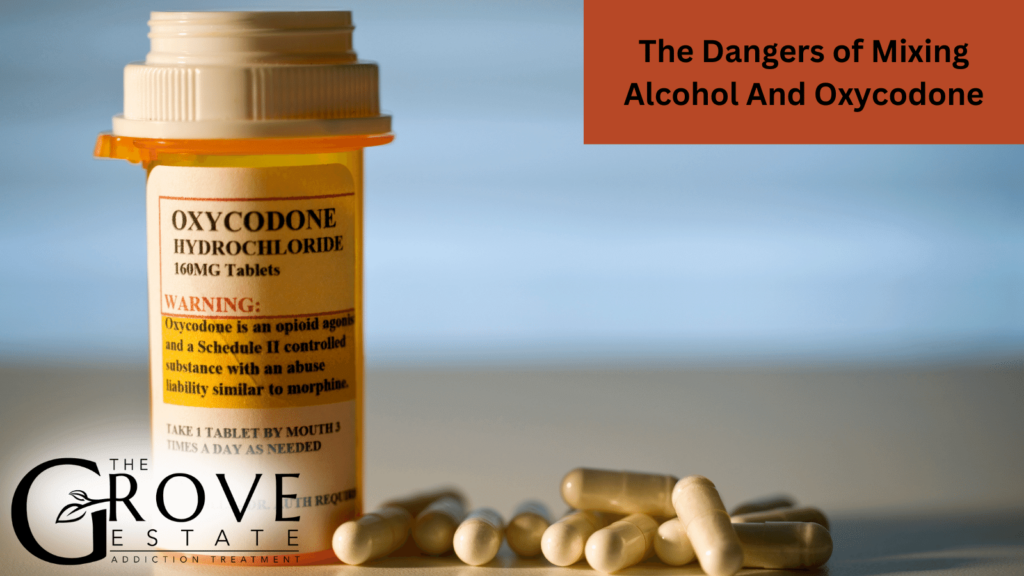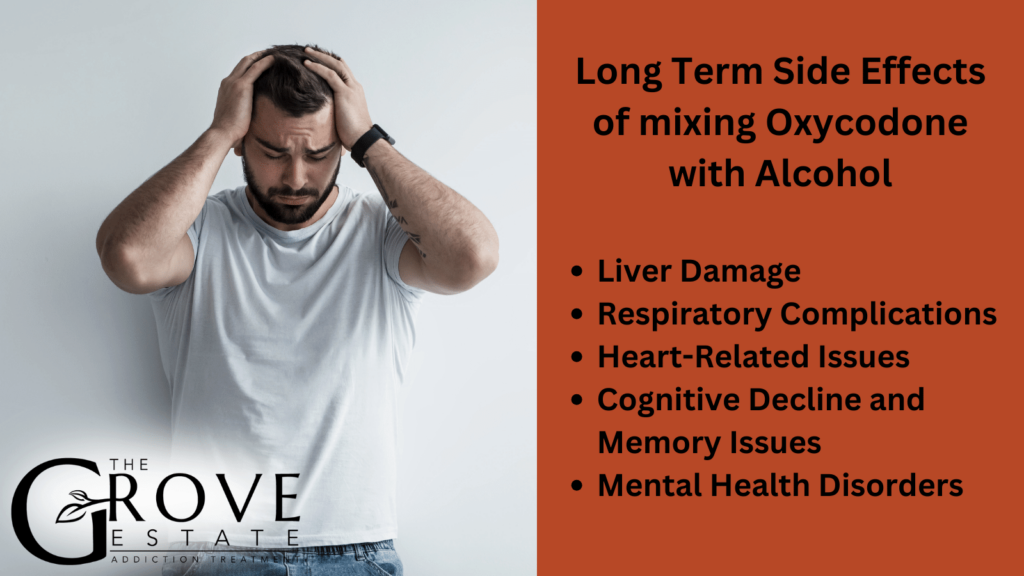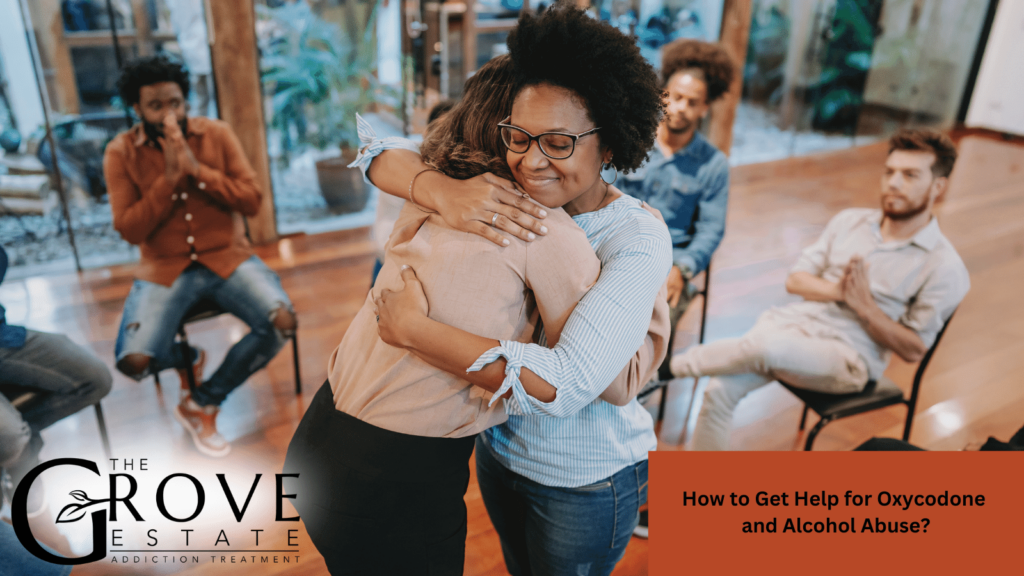Mixing alcohol and oxycodone, a prescription opioid painkiller, presents a dangerous cocktail with potentially lethal consequences. According to the World Health Organization (WHO), alcohol contributes to 3 million deaths each year worldwide, while the opioid epidemic, particularly in the United States, has been declared a public health emergency, with opioids involved in nearly 70% of all drug overdose deaths in 2019, as reported by the Centers for Disease Control and Prevention (CDC).
The prevalence of mixing oxycodone with alcohol is alarmingly high, especially given the enhanced risks this combination poses. Both substances when combined can lead to heightened sedation, respiratory depression, and potentially fatal overdoses. This combination can also increase the risk of addiction to both substances, complicating treatment and recovery efforts.

What is Oxycodone?
Oxycodone is an opioid medication prescribed for moderate to severe pain relief. It functions by changing how the brain and nervous system perceive pain. Available in immediate-release (IR) and extended-release (ER) forms, it’s used for various pain management needs. Immediate-release versions offer quick relief, while extended-release forms provide continuous pain control.
Commonly known oxycodone brands include OxyContin® (extended-release) and Percocet® (a combination with acetaminophen). Despite its effectiveness in pain management, oxycodone has a high potential for addiction and abuse, making it a Schedule II controlled substance in the U.S., indicating its medical value alongside a significant risk of dependency.
What are the Dangers of Taking Oxycodone with Alcohol?
When oxycodone and alcohol are consumed together, they interact in a way that significantly amplifies their individual effects, particularly their sedative properties. Both substances depress the central nervous system, slowing down brain activity, heart rate, and breathing. This combined effect can lead to dangerous levels of sedation and respiratory depression, where breathing becomes shallow or stops entirely, posing a significant risk of fatal overdose.
The immediate effects on the body from mixing these substances can include profound drowsiness, dizziness, impaired motor control, confusion, and lowered blood pressure. These reactions not only increase the risk of accidents and injuries but can also lead to severe health emergencies, such as coma or death. The combination exacerbates the potential for both addiction and adverse reactions, making it a risky and potentially lethal mix.
What are the Short-Term Side Effects of Mixing Oxycodone and Alcohol?
Mixing oxycodone with alcohol can lead to severe short-term side effects due to the intensified depressant effects on the central nervous system. Health risks and potential complications include extreme drowsiness, dizziness, impaired cognitive and motor functions, nausea, vomiting, respiratory depression, and increased risk of overdose. These effects not only compromise safety by increasing the likelihood of accidents but also pose serious health threats that can escalate rapidly.
Warning signs of adverse reactions to be aware of include difficulty breathing, confusion, unconsciousness, and unresponsiveness. Bluish lips or fingernails, pinpoint pupils, and extreme lethargy are also critical indicators that immediate medical attention is needed. Recognizing these signs early and seeking help can be life-saving, as the combination of oxycodone and alcohol can lead to fatal outcomes if not addressed promptly.
What is the Risk of Overdose from Alcohol and Oxycodone?
Mixing alcohol and oxycodone heightens the risk of overdose because both substances synergistically depress the central nervous system, leading to a perilous decrease in breathing and heart rate, potentially culminating in respiratory arrest and fatal overdose outcomes.
Recognizing overdose symptoms is critical:
- Extreme drowsiness or inability to wake up
- Loss of consciousness
- Slowed or irregular breathing
- Limp body
- Cold and clammy skin
- Bluish lips or fingernails
- Coma
In the event of a suspected overdose, immediately call emergency services. Don’t wait for all symptoms to manifest; overdoses can progress quickly. Keeping the individual awake and breathing is crucial, and if naloxone is available and you’re trained to use it, administer it to temporarily reverse the overdose effects. An alcohol and oxycodone overdose is a medical emergency, demanding swift action.

What are the Long-Term Dangers of Combining Alcohol and Oxycodone?
Long-term combination of alcohol and oxycodone can lead to severe chronic health issues, impacting both mental and physical health significantly. Chronic use of these substances together can result in:
- Liver Damage: Both alcohol and oxycodone are processed by the liver, and their combined use can lead to alcoholic liver disease or exacerbate existing liver conditions.
- Respiratory Complications: Chronic respiratory depression is a risk with prolonged opioid use, and when combined with alcohol, the risk of life-threatening respiratory issues increases.
- Heart-Related Issues: The mix can elevate the risk of developing heart conditions due to the stress and damage caused to the cardiovascular system.
- Cognitive Decline and Memory Issues: Extended use can lead to problems with memory, attention, and decision-making processes, complicating daily functioning.
- Mental Health Disorders: There’s an increased likelihood of experiencing mental health challenges such as depression and anxiety, as the combination disrupts normal brain chemistry and neural pathways.
These long-term dangers highlight the critical need for addressing substance misuse early to avoid serious, potentially irreversible health outcomes.
Alcoholism and Oxycodone Abuse as Co-Occurring Disorders
The link between alcoholism and oxycodone abuse is significant, with individuals often using both substances simultaneously, leading to compounded health risks and complex treatment challenges. Treating co-occurring disorders requires a nuanced approach that addresses both the addiction to oxycodone and the dependence on alcohol, understanding that each can exacerbate the other. This complexity often necessitates integrated treatment strategies that focus on the entire spectrum of an individual’s addiction and mental health needs, making recovery a more challenging but achievable goal.
What are the Treatment Options for Alcohol and Oxycodone Addiction?
For those grappling with addiction to both alcohol and oxycodone, a range of treatment options is available, each tailored to address the multifaceted nature of co-occurring substance use disorders. Effective approaches often combine medical intervention, behavioral therapies, and support mechanisms to foster a holistic recovery:
- Detoxification under medical supervision is the initial step, ensuring withdrawal is managed safely.
- Inpatient or Outpatient Rehabilitation Programs provide structured treatment environments. Inpatient programs offer an immersive therapy experience, while outpatient settings allow individuals to maintain their daily responsibilities.
- Medication-Assisted Treatment (MAT) utilizes medications to ease withdrawal symptoms and cravings, supporting overall recovery efforts.
- Behavioral Therapies, such as Cognitive Behavioral Therapy (CBT) and Motivational Interviewing (MI), help individuals develop coping strategies and address the psychological aspects of addiction.
- Support Groups and Peer Networks, like Alcoholics Anonymous (AA) and Narcotics Anonymous (NA), offer ongoing encouragement and accountability from others who have experienced similar challenges.
Access to comprehensive rehabilitation and recovery resources is crucial for individuals seeking to overcome addiction to alcohol and oxycodone, providing the support and tools necessary for lasting recovery.

How to Get Help for Oxycodone and Alcohol Abuse?
Getting help for oxycodone and alcohol abuse starts with acknowledging the need for support. The initial step is to reach out to a healthcare professional who can guide you towards the right treatment plan, which may include detoxification, therapy, and medication-assisted treatment. Exploring both inpatient and outpatient rehab options is key to finding a program that suits your needs. Additionally, support from groups like Alcoholics Anonymous (AA) or Narcotics Anonymous (NA) can be invaluable. Engaging with therapy, such as Cognitive Behavioral Therapy (CBT), offers strategies to manage cravings and build a healthier lifestyle. Accessing these support systems and therapy options is crucial for recovery.
Is it safe to quit oxycodone and alcohol cold turkey?
Quitting “cold turkey” can be dangerous due to severe withdrawal symptoms. Medical supervision is recommended for safety.
How long does recovery from oxycodone and alcohol addiction take?
Recovery is a lifelong process. While initial treatment may last from a few weeks to several months, maintaining sobriety is an ongoing effort.
What are the first signs of addiction to oxycodone and alcohol?
Signs include increasing tolerance, inability to stop using, withdrawal symptoms, and prioritizing substance use over other activities.
How is co-occurring alcohol and oxycodone addiction treated?
Treatment involves an integrated approach with detoxification, medication-assisted treatment, and behavioral therapies to address dual addiction.
How does alcohol interact with mental health medications?
Combining alcohol with mental health medications can lead to dangerous and potentially life-threatening interactions. Alcohol can diminish the effectiveness of mental health medications, leading to worsened symptoms or decreased stability. According to alcohol.org, substances like alcohol and Meth can exacerbate the side effects of mental health medications, increasing the risk of sedation, hypertension, and severe mood swings. This underscores the critical importance of consulting healthcare providers about alcohol use when taking any psychiatric medication.
For those seeking alternatives to manage mental health conditions in conjunction with substance use issues, residential detox programs offer a supportive environment to safely navigate withdrawal symptoms from both alcohol and medications. These programs can also provide holistic approaches to mental health care, integrating therapy and medication management tailored to individual needs. This comprehensive care model ensures that individuals receive the support necessary for both detoxification and ongoing mental health management.

Share This Post



